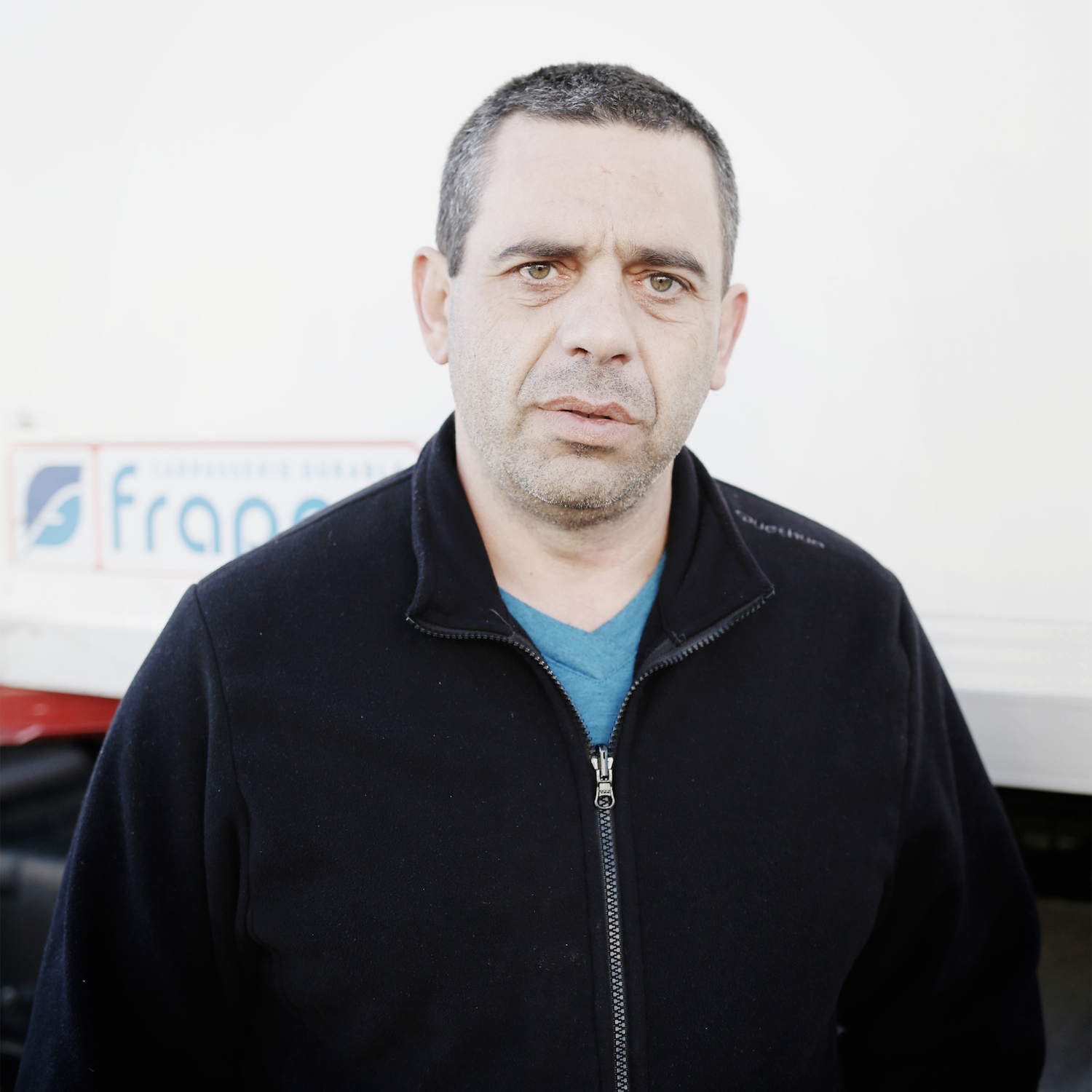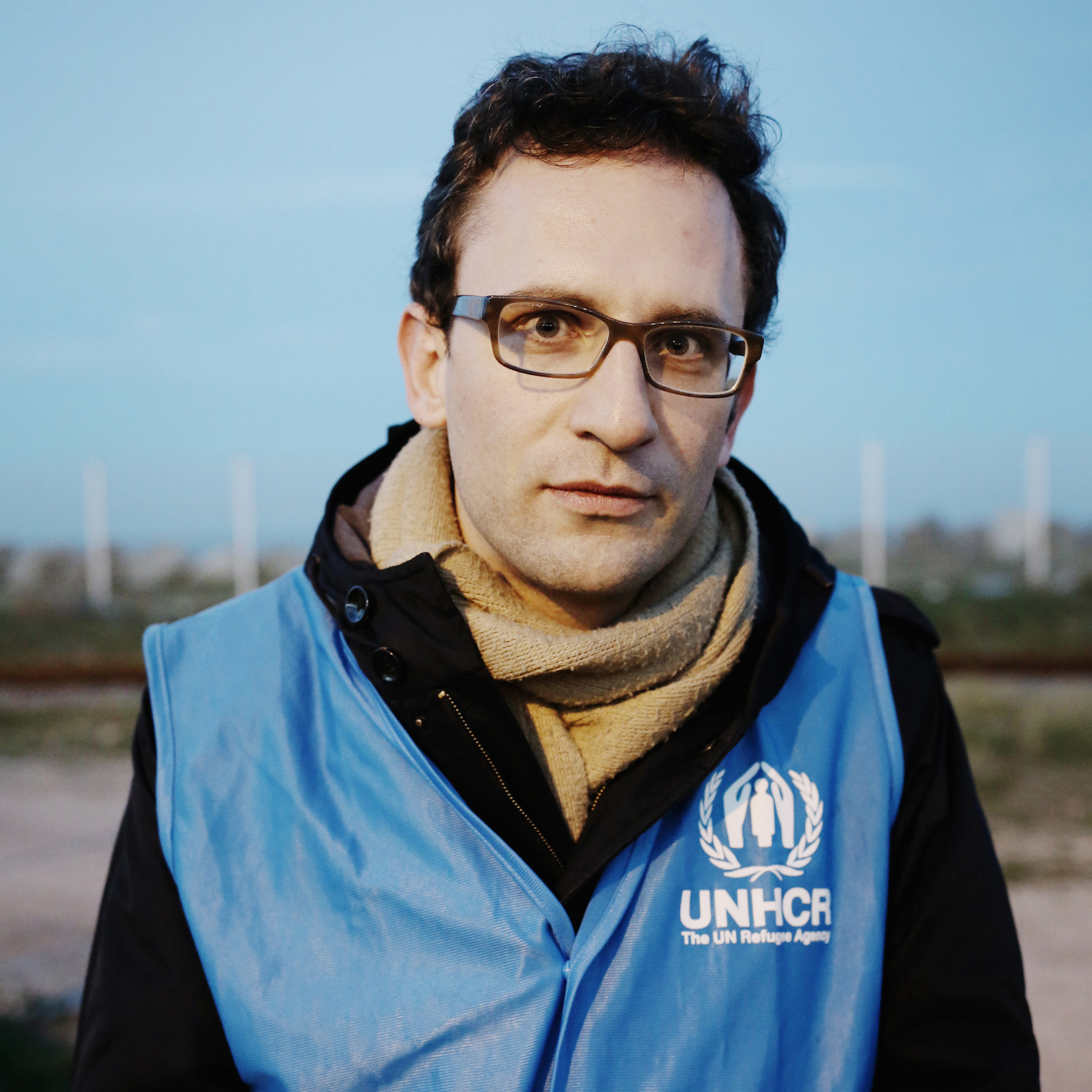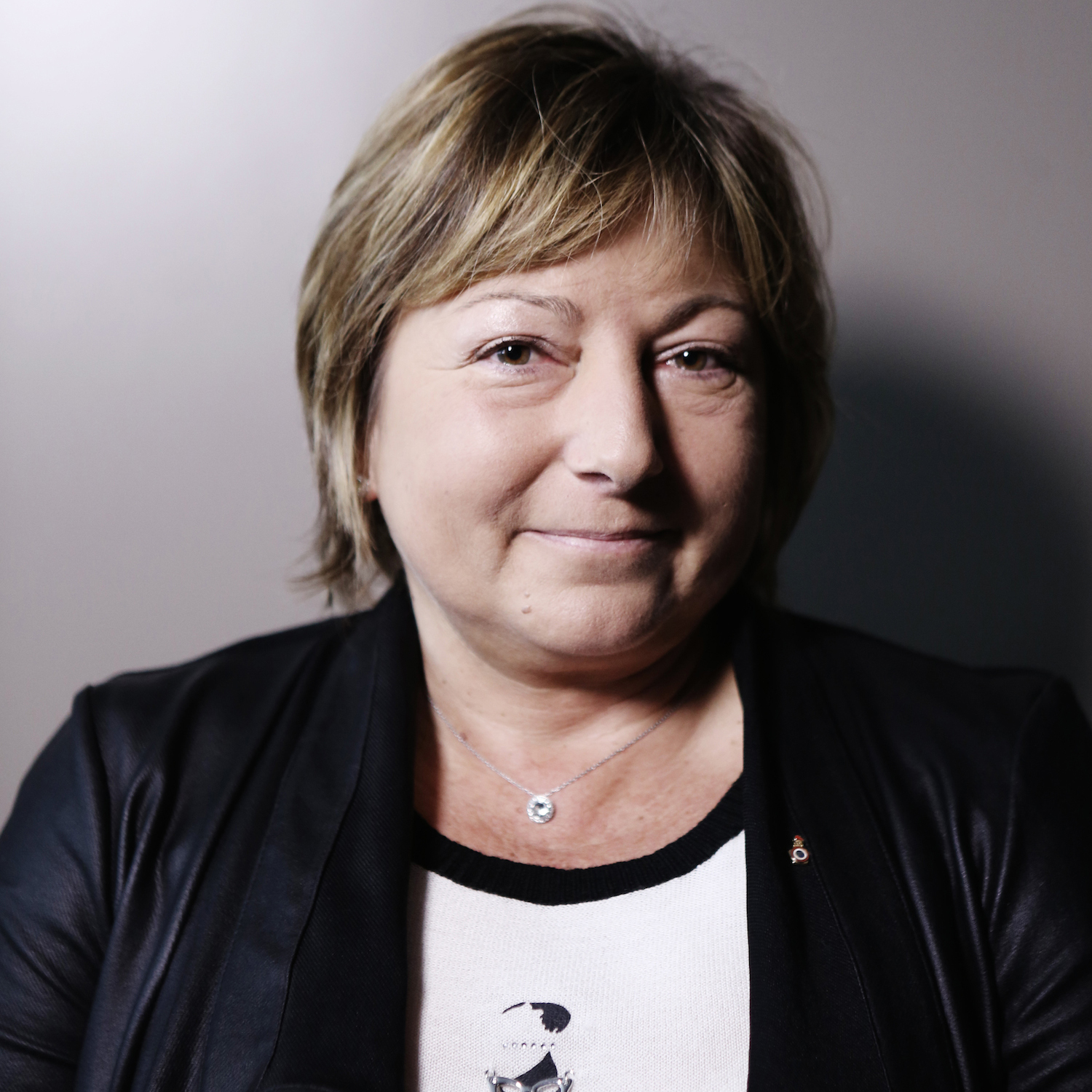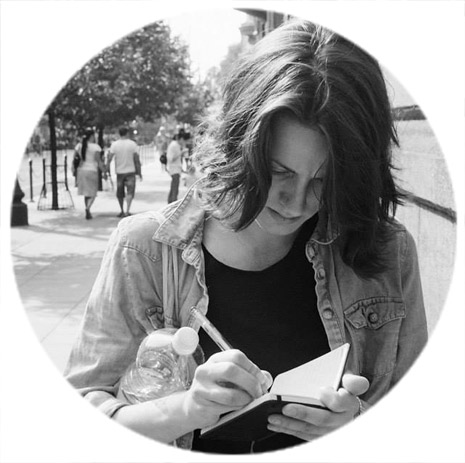 Syrian refugees awake in front of a church in Calais, France.
Syrian refugees awake in front of a church in Calais, France.UNHCR/Julien Pebrel
Syrian refugees awake in front of a church in Calais, France.
UNHCR/Julien Pebrel
Welcome to Calais
For thousands of people fleeing war and persecution at home, the French port of Calais feels like a point of no return.
Storm clouds are gathering over Calais. In the drizzle, a ferry bound for Dover, England, slowly motors out of the port, its horn reverberating through the streets of this small French city. I wonder, as I gaze out of my hotel window, if Mohamed survived the freezing temperatures last night. If Ahmed made it aboard this morning. And if Ali even had the strength to try.
In recent years, the port of Calais has become a magnet for migrants and refugees, with up to 2,300 currently living in dire conditions on the streets or in squats. Many are here with the hope of reaching safety in the United Kingdom, having travelled thousands of miles to escape war or persecution back home. So far, Europe has offered them little in the way of relief. The majority are men – from Syria, Afghanistan, Eritrea, Iraq, Sudan and beyond – but there are women and children, too. They came in search of sanctuary, only to find new horrors.
In the two main makeshift camps here, living conditions have reached rock bottom. Tents are torn and tattered, garbage is piled high and the ground is muddy and waterlogged. Many people are sick. Most are waiting for nightfall so that they can try one more time to make it across the Channel. If they fail, they vow to try again tomorrow.
But the growing population of migrants and refugees is fuelling tensions within the local community, prompting the mayor to plead for action and leaving charities overstretched. UNHCR is working on alternatives with the French Government, which has begun strengthening its capacity to process asylum claims and offering temporary accommodation for asylum-seekers.
Today – a cold, wintery morning in November – I am packing my bags to leave. Many others here have nothing left and nowhere else to go.
Welcome to Calais.

Three years ago, 29-year-old Ahmed had a future in his home city of Damascus. Now, after fleeing the war, he is trapped in Calais, hoping to make it to the UK. UNHCR/Julien Pebrel
The Gamer
“Kate!” Ahmed calls out to me, as I run through the rain to reach the porch of the church that he currently calls his home. “Remember Resident Evil?”
I laugh and sit down. Over the last couple of days, Ahmed and I have been bonding over a shared love of hair-raising 90s video games. “That was a good one,” I agree, and he nods enthusiastically. “I played all of those,” he says.
That was before the war in Syria forced him to flee his home. Now he is living on the streets of Calais, hoping to find safety in England, but as security here intensifies his dreams are slowly falling apart.
“I was at the port this morning as it opened at five o’clock,” he tells me, his breath hanging on the frozen morning air. “They caught nearly 25 people inside the trucks. Nobody made it. Now it’s impossible to cross.”
“I miss my family, I miss my street, I miss my house,” he says. “If I could go back to Syria, I’d go today.”
Three years ago, back home in Damascus, Ahmed had a future. Today, he has little to show for it apart from his degree certificate from veterinary school. He carried it with him all the way through Lebanon, Algeria, Tunisia, Libya, Italy and, finally, France.
“I miss my family, I miss my street, I miss my house,” he says, as the rain seeps into his tattered sleeping bag. “I don’t like it here. If I could go back to Syria, I’d go today. Even with the war, it’s better. At least there you’re killed with honour. Here, you sleep without it.”
But even though his hope is fading, Ahmed’s resilience, charm and good humour shine through. As I hug him goodbye on the steps of the church for the last time before I travel onto London – a privilege I have earned through nothing more than accident of birth – he winks at me. “Tomorrow I’m going to London,” he says. “In the morning. See you there.”

Mohamed, 29, fled the war in Darfur where he worked with the UN, teaching IDPs how to build houses. Now, he is stranded in Calais, dogged by a persistent cough. UNHCR/Julien Pebrel
The Humanitarian
The makeshift camp commonly known as Tioxide is the last thing you’d expect to find in Calais. What was once a football field and a gymnasium in now a squalid encampment, with tents crammed into every available space and waste piled high around its borders. For Mohamed, who fled Sudan last year, it has been home for nearly three months.
“We ran from the problems,” he tells me one afternoon, as we trudge through the waterlogged field to his tent. “But we found another problem here in France.”
Inside the ripped, green tarpaulin, rain permeates everything. Even Mohamed’s sleeping bag has not escaped the deluge and he is dogged by a persistent cough. “Most people in these camps are cold because the weather is bad,” he explains. Looking around, it is not hard to see why.
He holds up a sheet of pills that, upon closer inspection, turn out to be nothing more than paracetamol. “This is medicine for any ills. They give this for anything. Head, arms, legs, malaria. And this is Europe?”
“We ran from the problems,” he tells me. “But we found another problem here in France.”
It was April when Mohamed left home, fleeing first to Libya and then crossing the Mediterranean Sea to Italy. For years before that, he had worked with the United Nations in Darfur, teaching displaced people how to build houses. He reaches into his pocket and pulls out his prized Samsung tablet, wrapped in a plastic bag. “Come,” he says. “I show you my activities in Darfur.”
As we sit together, scrolling through photos from happier days, he smiles for the first time since we met. He shows me his friends. His certificates. His family. I wonder what he must feel, having fled violence in Sudan, only to be plunged into conditions like these. “I find that Europe is not good,” he says. “France doesn’t give me document. So I have a lot of problems.”
He sighs, wistfully, as the tablet’s fading battery light blinks at him. “What to do? What to do? I just want a good life.”

Ali was an English teacher back in Syria. Now, he is stranded on the streets of Calais, hoping to smuggle aboard a lorry to the UK and find safety. UNHCR/Julien Pebrel
The English Teacher
It’s a freezing November night when I first meet Ali*, outside the factory loading bay where many Syrians like him sleep rough. “I was an English teacher,” he says as he hugs his sleeping bag closer. “Now I am homeless.”
I warm to him immediately. He’s shorter than the others, with sparkling brown eyes and a wide grin. After fleeing the war in Syria, he braved the journey to Calais, where he has been living for a month. At the evening food distribution, where a charity called Salam hands out trays of chicken curry, he insists that I share his. “I am inviting you,” he says, smiling. “There is equality here.”
The next day, I meet Ali again at Tioxide, the makeshift camp on the outskirts of town which primarily harbours migrants from Sudan. Although he walks with a slight limp – the result of a failed attempt to smuggle aboard a lorry – he is keen to be my guide. “So you are in our jungle,” he says with a laugh. “Come. I would like to show you the restaurant.”
At the evening food distribution, he insists that I share his chicken curry. “I am inviting you,” he says, smiling. “There is equality here.”
I’m in disbelief, but sure enough, there it is: a rough wooden shelter covered with a tarpaulin, where two young Eritrean girls are serving soup and tea. And next to it, a hairdresser. “He’s so stylish,” Ali marvels, beaming, as we watch the young Ethiopian shave a man’s beard with a tiny razor blade. “He uses just this. It’s incredible!”
Later, when I ask Ali about his memories of Syria, he smiles. “I used to have a little coffee before my morning tuition. Oh, it was wonderful!”
But his smile fades when I talk about the future. “I tell my friends that I wish I would die in my country,” he says. “People die every day here, believe me.”

Many truck drivers like this one, who often cross the English Channel, are worried about the situation in Calais and want to see a solution. UNHCR/Julien Pebrel
The Truck Driver
For many of the migrants here in Calais, the only way across the Channel is in the back of a truck or beneath the axle. So when a Spanish truck driver wanders over to me as I’m talking to Ahmed from Syria, I’m not sure what to expect. As it happens, Ahmed recognizes him.
“Did you see me?” Ahmed asks, excitedly. “Not you,” the driver replies, with a smile. When he removes his sunglasses, I see that dark circles ring his eyes and he tells us he’s driving to Morocco. “Do you want to come?” he jokes.
His truck, parked nearby, towers over us. The wheels are almost as big as me, and Ahmed points to an area beneath the front axle where he recently found one of the migrants. “I get a lot of people doing it here. Also in Morocco.”
“I don’t want anybody under my truck,” he says. “For me, it is a huge risk. If they fall or slip, it is my fault.”
I wonder what he makes of the situation in Calais, as someone on the front line. “It’s not normal to see people living like this,” he says, gesturing towards the nearby loading bay, where around 20 Syrian migrants are camped out. “This is not the solution, either for us or for them. I don’t want anybody under my truck. For me, it is a huge risk. If they fall or slip, it is my fault.”
The driver tells me that many companies now forbid their employees to stop in Calais. “If you find someone on the other side once you’ve crossed, you have a big problem,” he explains. “You get fined £2,000 for each one.”
For now, he is bound for Morocco, but soon he will return to Calais and cross once again to England. “It is very complicated for us,” he says with a sigh.

Local man Luc* recently bought a house in Calais but says it has lost 30 per cent of its value as a result of the tensions. Now he worries about the future. UNHCR/Julien Pebrel
The Local
Luc* is rummaging through the boot of his car when I come across him one day while walking through the back streets of Calais. He looks like a gentle soul and takes the time to think when I ask how he feels about the growing number of migrants and refugees here. “I understand that it is bad in their country and that they have no choice about living here,” he says, hesitantly. “But I’m not sure how it’s going to end, and the town is getting tired of it.”
“I understand that there is war in their country,” he says, “but now the war is here.”
Luc, it turns out, was born and bred in Calais. Over the years, he has watched the crisis unfold, not least through his work as a firefighter. “I probably attend between five and 10 interventions due to migrants a day. I remember one guy who was put into an ambulance after he broke his arm. The next day, he came back to have his cast removed, because it was too visible.”
Recently, Luc bought his first house in the town, but he says it has already lost 30 per cent of its value. “Most people are trying to leave Calais,” he tells me as the wind howls around us. “Personally, I have no problem with the migrants, but there is a feeling of insecurity in the town. I understand that there is war in their country, but now the war is here.”

Stefan Maier, a protection officer from UNHCR, is concerned about the deteriorating situation in Calais and calls the conditions ‘appalling’. UNHCR/Julien Pebrel
The Protection Officer
Stefan Maier slips his arms into a blue UNHCR vest and peers out of the windows that line the hotel lobby. “There will be rain today,” he says. “It’s not going to be a good weather day.”
Maier understands the situation here in Calais better than many, having repeatedly visited the town to monitor developments. He’s a protection officer from UNHCR’s Paris office who has become increasingly concerned about the living conditions for migrants and refugees. “The humanitarian situation here is appalling,” he tells me, zipping up his rucksack. “The vast majority of people are coming from countries experiencing human rights violations and war. From UNHCR’s perspective, we consider providing for a more effective and credible asylum system of the essence.”
Looking forward, he hopes that the British and French governments can come together to find a solution. The signs so far are promising, he says, but much more needs to be done. “The Minister of the Interior recently announced the creation of a day centre, which will encompass showers, water points and a professionally cooked meal once a day. We see these efforts as considerable progress, but – except for the women and girls, who will have reception facilities 24 hours a day – it will remain a day centre, so we think it is important to also think about transitional shelter schemes or solutions.”
“The vast majority of people,” he says, “are coming from countries experiencing human rights violations and war.”
Maier, who hails from Vienna, began his UNHCR career in Morocco in 2007. He then moved on to the Democratic Republic of Congo before settling in Paris. In Calais, he finds the work undertaken by charities and NGOs particularly inspiring, as well as the resilience of the migrants themselves.
“Personally, what strikes me again and again when I’m here is to see the pensioners and these volunteers who work for several charities distributing food and clothes,” he says, stepping out of the hotel and into the rain. “The extent to which the migrants have preserved their humanity, despite the incredible risks and injuries and threats they receive, is very touching.”

The mayor of Calais, Natacha Bouchart, has called for help to deal with the influx of migrants in her town, but sympathises with their plight. UNHCR/Julien Pebrel
The Mayor
In the stately town hall of Calais, where a 74-metre-high clock tower is chiming noon, Natacha Bouchart takes a seat behind her desk. “We need a shared solidarity between each country,” she says, referring to the situation in the town. “The European hypocrisy cannot continue.”
Bouchart has served as mayor of the Pas-de-Calais region since 2008. Although she sympathizes with the plight of the migrants and refugees, she feels that the town can take no more and has appealed for help. “The influx of migrants into Calais has caused a lot of degradation in both private and the public squats,” she explains. “There is a lot of conflict between the migrants and the residents of Calais, and we don’t have the resources to deal with this.”
“We need a shared solidarity between each country” in Europe, she says. Here in Calais, “we don’t have the resources to deal with this.”
The daughter of an Armenian father and a Polish mother, Bouchart recently agreed with the French Interior Minister to open a day centre for the migrants. The Calais mayor says she foresees major problems for tourism and the local economy unless urgent action like this is taken.
“I will fight for humanity and firmness,” she says. “To resolve the situation in Calais is a duty.”
*Names have been changed for protection reasons.
